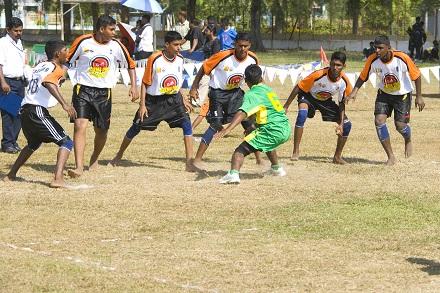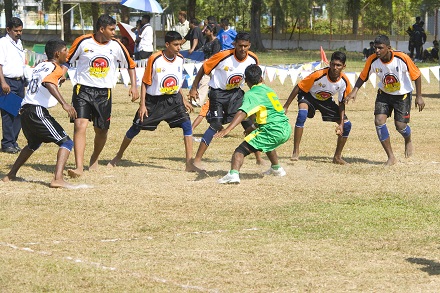

Case in point: kabaddi, the wannabe-Olympic sport you never heard of, in which you don’t inhale until you’re supposed to.
Kabaddi is a full-contact team sport in which "raiders" attempt to tag one or more members of the opposing team without exhaling a breath. (While raiding, the raider must loudly chant "kabaddi," confirming to referees that their raid is done on a single breath without inhaling). A 30-second limit is also enforced on each raid.
The sport's playing area is a field (or an indoor gym) about half the size of a soccer field. It doesn’t use pads, helmets or a ball and it’s played by both male and female teams. The sport is broken down into three major disciplines: Kabaddi (Traditional style), Beach Kabaddi (Beach style) and Circle Kabaddi (Circle style). The World Kabdadi Federation is the international governing body, and 48 countries are listed as national affiliates.
And with kabbadi’s continued inclusion in the Asian Games, and the growing prominence of other countries who are starting to excel at it, organizers have set their sights on the Olympics.
It was Indian Sports Minister Kiren Rijiju who in an interview, first gave voice to the lofty goal.
“Kabaddi has already been included in the Asian Games and now, not just India, but all Asian countries must come together to ensure that the sport is included in the Olympics as well,” he said, according to Asian News International. “That is our ultimate goal and to achieve that goal we must improve the standard of the game in India and also ensure that we propagate it across geographical locations in India and the rest of the world.”
India has long been a power in Kabaddi, although it’s certainly prevalent in other parts of the world. In fact, Iran ended India’s run of success by scoring double gold medals at the 2018 Asian Games, held at Jakarta Palembang.
Want another shock? There is a Team USA in Kabaddi. Yes. For real. According to Wikipedia, the first U.S. kabaddi team competed at the 2016 Kabaddi World Cup in Ahmedabad, India. The squad, led by Troy Bacon, was formed relatively quickly – and by comparison to other teams competing, was still considered completely new since many children grow up playing the game in the school yard. The squad for the World Cup consisted primarily of Florida A&M University graduates who were experienced in other sports, but were unfamiliar with the sport of kabaddi. Although the team lost all five of its group stage matches, the team was widely lauded in media coverage for its enthusiasm over the sport and its excitement about participating at the international level.
Cue the comparisons to the Jamaican Bobsled Team in the 1988 Olympics in Calgary.
And, notes the website for the Kabaddi World Cup, “it may seem unusual, but the United States of America has displayed a growing liking for kabaddi, especially in the last few years. Efforts to familiarize the rectangular form of kabaddi among the Americans have been constant, and have started to bear rewards… With a blend of physical and tactical players, this stage would be a great test for the Americans against other teams.”
Much of the early 2020 kabbadi season has been largely interrupted (making it no different from any other sport, for the most part); however, when Indian Sports Minister Rijiju made his most recent remarks, he was also participating in an online session for more than 700 regional coaches – all of whom were eager to return to play as soon as health officials allowed it to happen.
Still in doubt over whether kabbadi could make it big? Remember that the Asian Games have a history of being able to scope out in advance, and incorporate, sports on the rise. In 2017, it was announced that esports would be included in the 2022 Asian Games as a full medal sport. And that, of course, opened the door to the debate over Olympic inclusion of esports.
Remember too that under the IOC’s Agenda 2020, each host city of the Olympics is allowed to pick out a limited number of “showcase” sports that are not currently on the Olympic program. (For example, Tokyo will have skateboarding, surfing, karate, baseball/softball and sport climbing. Paris will have breakdancing, skateboarding, surfing and sport climbing). So if a future Olympic host decrees it, kabaddi may be making an appearance sooner, rather than later.
And in light of all the concern about COVID-19 safety measures, maybe a sport that regulates when and where you can inhale will stand a better chance.

